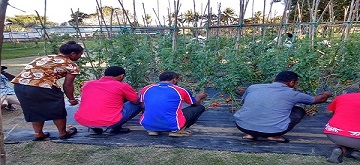22 August 2017
The recent catastrophic cyclones in Vanuatu and Fiji are putting the spotlight back on seed banks (and other measures for plant propagation) to help farmers rehabilitate their farms post-disaster and also adopt more proactive, adaptive measures for plant selection to improve their crops.
The recent catastrophic cyclones in Vanuatu and Fiji are putting the spotlight back on seed banks (and other measures for plant propagation) to help farmers rehabilitate their farms post-disaster and also adopt more proactive, adaptive measures for plant selection to improve their crops.
A recent PAFPNET discussion on rebuilding the agriculture sector and farmer livelihoods post-disaster suggested that access to seed stocks in the Pacific region was limited. Many countries do not have national seed banks, and there limited resources to establish and maintain seed banks for multiplication and distribution of high quality planting materials.
In Tonga, a seed storage and distribution centre has been established at Hango Agriculture College (HAC). The College seed centre and nursery enable HAC to select, store and distribute seeds to farmers. The seedbank will also source additional plants provided through SPC’s Plant Genetic Resource Centre (CePaCT) with EU-APP support, which already provided a wide range of plants and seeds in 2016. (See this story.) A fruit tree seedbank is also planned with breadfruit and other fruit trees supplied by MAFF.
At the launching of the Hango Seed Centre, the Minister for Agriculture, Hon. Semisi Tauelangi Fakahau commented that it was in line with work on a national seed policy which is under development and he thanked SPC and FAO for their support. The new Principal of Hango, Rev. Mr. Tu'ipulotu Finau, said the donor assistance was timely as it strongly supports the new Hango College vision to upgrade the training offered to include degree certification. The seed training can be easily integrated into the curriculum, with the nursery providing a hands-on practical site for the students.
Other recent seed activities in the region supported by SPC include:
- Pacific farmer exchanges on Open Pollinated Seeds in Queensland (October 2016), Australia involving 11 farmer organisations from Fiji, Samoa, Tonga, Solomon Islands, PNG and Timor-Leste as well as Australian farmer and research networks. (See the Seed Learning Exchange Report). This followed from a large farmer exchange on seeds in the Solomon Islands in November 2016, involving 60 farmers from Samoa, Tonga, Vanuatu, Timor-Leste, Fiji, PNG and Solomon Islands, which focuses on the seeds value chain and sharing of practices (See our PAFPNet story.)
- On a recent visit to Kiribati, SPC’s Soil Health team spent time training staff on saving seeds from Amaranthus and other crops in the course of conducting training on the use of compost to increase vegetable production on atoll soils. Agricultural production in both Kiribati and Tuvalu is restricted by lack of seeds, as well as water shortages, salinity and poor soils.
- The Integrated Crop Management project has been working with Fiji’s Ministry of Agriculture on the development of new varieties of fruit crops, including capsicum and chilli. The project is breeding the new varieties to produce sufficient quantities of foundation seed, which is then cropped and harvested to create an adequate supply of seeds for distribution to farmers.
- Studies for Pacific farming networks relating to Improving Access to High Quality Seed compiled by Pacific Island Farmers Organisation Network (PIFON), covers opportunities and constraints related to accessing seed in 5 member countries - Vanuatu, Solomon Islands, Tonga, Samoa and Fiji (PIFON Scoping Study Report).
- Through EU-APP support, PIFON also compiled a study in 2015 on Timor-Leste’s National Association of Commercial Seed Producers, ANAPROFIKO which is the national umbrella association of seed producer groups in Timor-Leste. It promotes the development of the commercial seed trade to achieve seed security and seed sovereignty leading to food and nutrition security. Since that study, ANAPROFIKO has now leveraged funding support from the IFAD/SDC-funded MTCP II program. (See report on ‘National Seed System for Released Varieties’).
- SPC regional survey conducted on seeds challenges reached 1060 PAFPNet members. A summary of the responses can be found here.
- Technical training on open pollinated seed production in Sigatoka, Fiji in August 2017. This 3-day workshop trained 23 Ministry of Agriculture extension officers and farmers on the processes of plant selection for development of new varieties, and the processes of seed extraction, drying and storage. The group learnt about new varieties of tomatoes (such as the new Fijian variety ‘Rio-gold’), capsicums, eggplants and other crops that are being developed, and how to advise on seed saving so that farmers’ own seed supplies will stay ‘true to type’ i.e. maintain the characteristics of the crop that have been identified as preferred by consumers. Extension officers and farmers heard directly from representatives of the tourism industry who were able to highlight strengths of local produce as well as identifying problems with the supply chain that cause quality problems. The workshop identified that the tourism industry needs better information on when they can expect local sources of crops to be available. Farmers wanted information on visitor numbers and how they relate to the tonnages of different crops that the industry needs.
Photo caption: Workshop participants harvesting the recently released tomato variety 'Rio Gold' to learn processes of extraction, washing, drying and packaging.





CONNECT WITH US